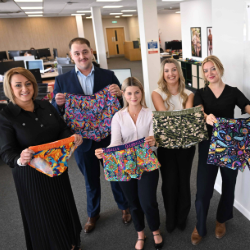Inspiring individuals to be awarded Honorary Degrees by Northumbria University
In recognition of their outstanding achievements, Northumbria University will confer honorary…
International
Northumbria’s global footprint touches every continent across the world, through our global partnerships across 17 institutions in 10 countries, to our 277,000 strong alumni community and 150 recruitment partners – we prepare our students for the challenges of tomorrow. Discover more about how to join Northumbria’s global family or our partnerships.
View our Global FootprintBusiness
The world is changing faster than ever before. The future is there to be won by organisations who find ways to turn today's possibilities into tomorrows competitive edge. In a connected world, collaboration can be the key to success.
More on our Business ServicesResearch
Northumbria is a research-rich, business-focused, professional university with a global reputation for academic quality. We conduct ground-breaking research that is responsive to the science & technology, health & well being, economic and social and arts & cultural needs for the communities
Discover more about our ResearchAlumni
Northumbria University is renowned for the calibre of its business-ready graduates. Our alumni network has over 246,000 graduates based in 178 countries worldwide in a range of sectors, our alumni are making a real impact on the world.
Our Alumni/404?item%2fbusiness-services%2fengage-with-us%2fthe-northern-hub-for-military-veterans-and-families-research%2fresearch%2fpast-projects%2f+(route%3a+{*pathInfo})&userextranet%5cAnonymous&sitewebsite cannot be found.
Please use the form below to report the broken link.
.png?modified=20250630105204)
In recognition of their outstanding achievements, Northumbria University will confer honorary…

An international conference celebrating the music of the medieval and Renaissance periods will…

A student team from Northumbria University’s Business Clinic is helping a pioneering renewable…

Northumbria University graduate, Rob Law MBE, joined sleep scientists and design experts from…

An Assistant Professor at Northumbria University won the Royal Society of Chemistry’s Award…

The Summer 2025 edition of Northumbria University’s newspaper is available to collect on campus…

Savvy students from Northumbria University Business Clinic have been helping one of the UK’s…

In this article originally written for The Conversation*, Dr Muhammad Wakil Shahzad, Associate…

Squires Workshops

School of Design
School of Design

School of Design, Northumbria University
Back to top